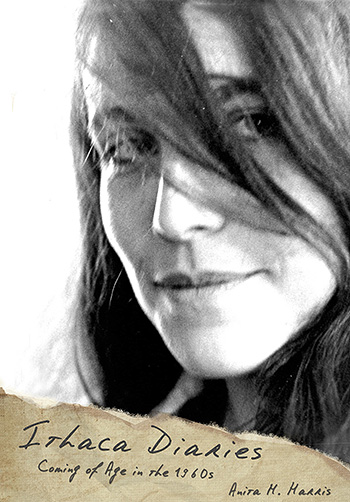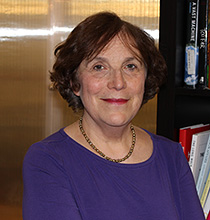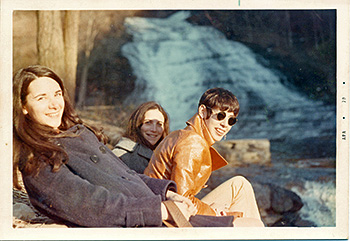Alumna's 'Ithaca Diaries' recounts transformative times

The cover of Anita Harris' book, "Ithaca Diaries: Coming of Age in the 1960s" (Cambridge Common Press, 2014). Image: Provided.
Whenever they went to college, most everyone thinks their undergraduate years were a noteworthy epoch of personal and societal transformation. Not everyone was at Cornell between 1966 and 1970, though, and even fewer kept detailed, heartfelt journals during that turbulent period.
Beginning a few years ago, Anita M. Harris '70 reread her journals, which had been stashed in cardboard boxes for more than four decades, and wrote "Ithaca Diaries: Coming of Age in the 1960s" (Cambridge Common Press, 2014).
Freshman fall semester starts frivolously enough, with a 17-year-old intellectual (Harris' word) riding shotgun to her first frat party in a red convertible (This Bill, a sophomore from Chicago, tells me he only dates freshmen women -- before they get big calves from climbing the hills) before Cornell life gets dauntingly politicized, racially charged, confusing and ultimately terrifying (her word, repeatedly).
Teach-ins and rallies escalate to protests, sit-ins, strikes and building occupations. There are bomb scares and Molotov cocktails, reports of rifles and ammunition caches, arrests and suspensions at a campus under martial law.
Among the bystanders, observers and sometime-participants is a frightened English major on a wild learning curve -- taking it all in, trying to make friends and find a lover, wishing she were more radical but settling for "moderate liberal" -- and writing, writing, writing.

Anita M. Harris '70. Photo: Provided.
Journaling came naturally, Harris recalls, but it was James McConkey, novelist and professor emeritus, who insisted: Writing was the only way to make sense of a crazy time -- subsequently, if not in the moment.
Every bulletin from the Arts Quad (I don't approve of anybody's taking over a building, whether for self-determination or any other reason, but I also think it's wrong for students to attack one another, and because I'm worried about my Existentialism classmates, I join the picket line) is matched with a freshmanic sentiment (This boy is brilliant, I am convinced, and really searching for knowledge. Too bad he's a wet kisser). That's expected in a nonfiction piece Harris mentally subtitled "Gidget Goes to the Revolution."
Harris was at the 1969 Willard Straight Hall takeover, joining a human barricade around the building to "protect" black student activists inside and writing about it each night.
She had friends among the Daily Sun staff, and archival sources at the Sun and Cornell Alumni News help to in-fill and fact-check narratives of particular events (At 2:30 a.m., two Molotov cocktails hurled through a window at Olin Library start two fires … watchman says he saw two whites fleeing the scene … windows are smashed at Day and Cascadilla halls … Safety Division officers find unignited firebombs in the basements of Morrill and McGraw Halls).

Anita Harris '70, center, and Suzanne (Smith) Quick '70 right, with a friend at left at Buttermilk Falls State park in the winter of 1970. Photo by Vincent Blocker '70.
Noteworthy times, indeed.
At last comes the spring of her graduation year, and Harris commits a final act of civil disobedience: supplying whiteface makeup for fellow objectors at ROTC commissioning ceremonies.
Waiting for Barton Hall ceremonies to begin -- a combination commencement and investiture of President Dale R. Corson -- Harris and friends pass joints, and she wafts blissfully through the mayhem that ensues. Nevertheless, her account of the notorious head-whacking incident with the University Mace is one of the most vivid in publication. (And the diarist's subsequent fact-checking clarifies who thunked whom: Historian Morris G. Bishop versus agitator Melvin Margulies, not David Burak. History stands corrected, but the mace is still bent.)
At a graduation dinner with family overlooking Cayuga Lake, Harris is toasted by her immigrant grandfather ("L'chaim!" in Yiddish, meaning "To life!"). She packs away the journals and gets on with her life, which includes successful careers in print and broadcast journalism.
Currently, Harris is head of a communications consulting firm in Cambridge, Massachusetts; a sustaining member of the President's Council of Cornell Women; past board member of the Cornell Club of Boston; and founder of an organization called Ivy+ Single Alumni. A new edition of her book, "Professional Women and the Quest for a New Feminine Identity," is out this year.
Paperback and Kindle editions of "Ithaca Diaries" are now available and copies will also be sold at The Cornell Store.
Additional info:
Also by Anita M. Harris: "Broken Patterns: Professional Women and the Quest for a New Feminine Identity"